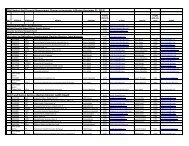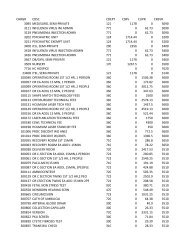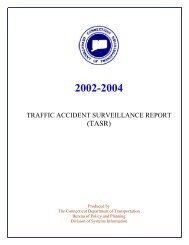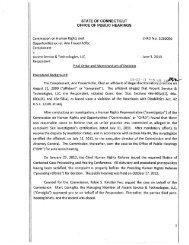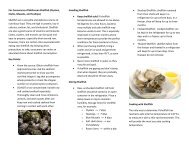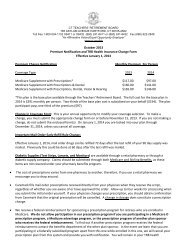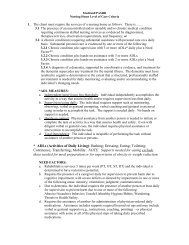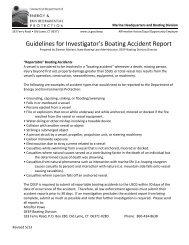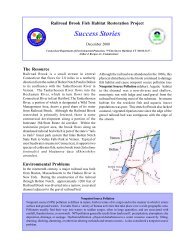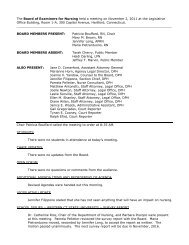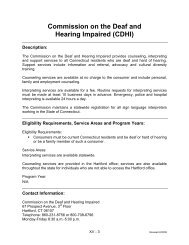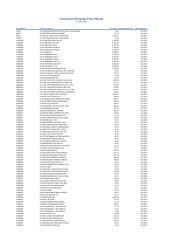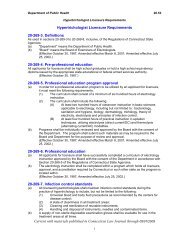Public Act 490 Guide - CT.gov
Public Act 490 Guide - CT.gov
Public Act 490 Guide - CT.gov
You also want an ePaper? Increase the reach of your titles
YUMPU automatically turns print PDFs into web optimized ePapers that Google loves.
transfer did not result in the declassification of<br />
the property or in the imposition of the PA <strong>490</strong><br />
recapture tax because it was not a sale for a price.<br />
PA<br />
<strong>490</strong><br />
APPENDIX E: SUPPLEMENTAL COURT CASES RELATED TO PA <strong>490</strong><br />
Hyman Birnbaum v. Town of Madison,<br />
January 9, 1996 Docket No. 379635<br />
An owner of land classified as forest land<br />
had transferred the land for no consideration to<br />
a revocable trust of which he was the grantor,<br />
one of the trustees and the beneficiary. In this<br />
unreported Superior Court case, the court held<br />
that such a transfer would not be a sale giving rise to the obligation<br />
to pay the PA <strong>490</strong> recapture conveyance tax.<br />
• Interpretation of when 10 year holding period starts again:<br />
Ramsay v. Town of Southington, August 13, 1996<br />
CV96-0473690S<br />
The Superior Court ruled that the exemption of Section 12-504c<br />
with respect to transfers upon death does not start a new 10-year<br />
holding period for the beneficiary, require a new farmland application<br />
or generate an automatic declassification.<br />
STEPNEY POND ESTATE LTD. v. TOWN OF MONROE,<br />
June 4, 2002 260 Conn 406<br />
Forest land was classified under <strong>490</strong> in 1971. Such land transferred<br />
in succession from a husband to his wife when he died in 1983.<br />
The wife died in 1986, and then in 1990, the wife’s Executors transferred<br />
the same land for no consideration to a corporation created<br />
by her two children who were the beneficiaries of the wife’s estate.<br />
The Supreme Court held that none of the transfers either declassified<br />
the land, started a new holding period or generated the PA <strong>490</strong> recapture<br />
tax. The decision is based upon the exemption in 12-504c(11)<br />
and the particular “tacking” provision which allows dating the<br />
classification back to the decedent’s date of acquisition.<br />
The Supreme Court clarified that automatic declassification<br />
happens only when a “triggering event,” meaning a sale or a change<br />
of use, occurs during a period when the PA <strong>490</strong> recapture conveyance<br />
tax would otherwise be due.<br />
There is language in the case suggesting that the legislature<br />
should revisit the statutes to clarify for all the exemptions in 12-504c<br />
as to which ones reset the ten-year holding period.<br />
Note: Diane M. Lathrop v. Board of Tax Review Town of Lyme,<br />
June 13, 1989 18 Conn. App. 608, a case involving open space,<br />
appears to have been overruled by Stepney above.<br />
DECLASSIFICATION ON SUBDIVISION OR<br />
APPLICATION FOR OTHER LAND USE APPROVAL<br />
• Interpretation of 12-504h Change of use:<br />
The importance of the actual use of the classified property not<br />
changing is crucial.<br />
Willis Maynard V. Town of Sterling, October 27, 1994<br />
12 Conn. L. Rptr 559<br />
The Superior Court determined that a landowner of classified<br />
farmland who obtains a 15 lot subdivision, files the subdivision plan<br />
and then commences construction upon or sells eight of those lots,<br />
holding the remainder out for immediate sale and construction, by<br />
openly marketing the lots, has changed the use, even though the<br />
unsold lots are still being used to grow corn. However, the mere<br />
approval of the subdivision does not necessarily equal a change of<br />
use under PA <strong>490</strong>.<br />
Carmel Hollow Associates, LP v Town of Bethlehem,<br />
October 9, 2002 CV00-0082591S<br />
The Superior Court held that under the statutory scheme of the<br />
time, only the State Forester could declassify forest land, even if the land<br />
had been subdivided and lots were being sold. Note that the statutes<br />
now provide that a private certified forester determines whether<br />
land is eligible for forest land certification, a decision which can be<br />
appealed by the assessor or the land owner to the State Forester.<br />
GRISWOLD AIRPORT, INC. v TOWN OF MADISON,<br />
December 23, 2008 289 Conn. 723<br />
Land used as an airport had been classified as open space<br />
under PA <strong>490</strong>. A contract purchaser obtained special exception<br />
approval from the Town to build 127 condominiums on the property.<br />
The town then declassified the property, even though the actual<br />
use as an airport had not changed. The landowner argued that the<br />
approvals were not final. The Supreme Court held that what mattered<br />
is whether the actual use of the open space had changed as of the<br />
declassification date, not whether approvals had been obtained for<br />
potential future uses. In an appeal under 12-119 the plaintiff had<br />
only to prove that the assessment was illegal, and this appeal is<br />
therefore appropriate to claims of improper declassification.<br />
FAILURE TO FILE <strong>490</strong> APPLICATION ON TIME<br />
• Interpretation of 12-107d (forest land) regarding initial filing:<br />
MARY W. RENZ v. TOWN OF MONROE, March 22, 1972<br />
162 Conn. 559<br />
The State Forester completed the certification that certain land was<br />
designated as forest land after October 1st but prior to October 31st.<br />
The Supreme Court held that such certification had to be completed<br />
on or before October 1st to apply to that grand list year.<br />
• Interpretation of 12-107e (open space) regarding initial filing:<br />
George McColgan v. Town of Woodstock, April 3, 1998<br />
Docket CV97-0056641S<br />
Buyers purchased property in September that had been classified<br />
as open space while owned by the previous owner. The new owners<br />
did not file to reclassify the land until after October 31st of the same<br />
year. The Superior Court held that the sale automatically declassified<br />
the land and that the new owners had to file for reclassification by<br />
October 31st. Since they had not, they were obliged to pay taxes<br />
based upon the full fair market value of the property.<br />
50<br />
<strong>Public</strong> <strong>Act</strong> <strong>490</strong>: A Practical <strong>Guide</strong> and Overview • http://www.cfba.org/pa<strong>490</strong>guide.htm • Connecticut Farm Bureau Association



